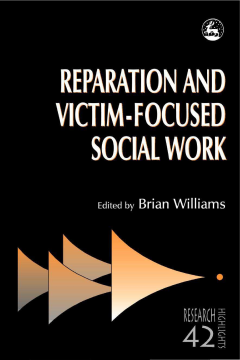
Additional Information
Book Details
Abstract
Reparation and the place of the victim in the criminal justice process have been the focus of recent legislation and policy initiatives. As a result practitioners are required to place more emphasis on working with victims. The contributors to this book bring together research material from the wide range of disciplines involved and present an overview of the information needed for effective practice.
They examine the practicalities of reparation orders, family group conferencing, restorative cautioning schemes and the workings of youth offending teams. They also evaluate the effects of legislation such as the Crime and Disorder Act and the Victim's Charter and explore issues raised by specific types of crime such as urban and rural crime, 'hate crimes' and male violence in the home. This book is essential reading for all agencies and individuals working with offenders and their victims.
Last year I said that the proponents of restorative justice had made their point and what was now required was some more critically minded discussion of this new approach in practice. Step forward Reparation and Victim-Focused Social Work, a collection of 10 essays on initiatives to better serve the interests of victims of crime.
Community Care
Students, practitioners and academics from a multidisciplinary and multidimensional array with a common interest in reparation and victim-support services will benefit from reading the book.
Southern African Journal of Criminology
It is a valuable reader for those more directly engaged in the production of policy, training and professional practice in a field that has been relatively neglected by research... The book is accessible, clear and the chapters are well paced. This edited collection of research informed chapters on victim-focused interventions introduces us to a range of key themes, issues and problems around involving victims in the process and the outcomes of the UK justice system. It is a valuable reader for those more directly engaged in the production of policy, training and professional practice in a field that has been relatively neglected by research. The book is accessible, clear and the chapters are well paced... it deserves to be read widely.
The Howard Journal of Criminal Justice
This book will be of great interest to practitioners in Probation and Youth Offending Teams, Victim Support, Police and others who are involved in the delivery of services to victims if crime.
VISTA
Williams has used a most comprehensive approach. The range of issues covered includes family group conferencing, restorative justice, victims of racial abuse, victim impact statements, and listening to the victims of abusive men. They examine the practicalities of a number of schemes, and the workings of youth offending teams. They also evaluate the effects of he victims Charter and legislation such as the recent Crime and Disorder Act.
Quakers in Criminal Justice Newsletter
This is a challenging collection of papers which should have a well-deserved place on the bookshelf of agencies or individuals working with offenders or their victims.
Quakers in Criminal Justice
Table of Contents
| Section Title | Page | Action | Price |
|---|---|---|---|
| Reparation and Victim-Focused Social Work | 4 | ||
| Contents | 6 | ||
| 1. Introduction | 8 | ||
| 2. Compensating Victims of Violent Crime in the European Union: The Case for State Restitution | 17 | ||
| 3. Restorative Justice: The Choice between Bilateral Decision-making Power and Third Party Intervention | 35 | ||
| 4. Family Group Conferencing: A Victim Perspective | 46 | ||
| 5. Reparation Orders | 67 | ||
| 6. Responding to Victims of Crime in Rural Areas | 85 | ||
| 7. Supporting Victims of Racist Abuse and Violence | 106 | ||
| 8. Probation Work with Victims of Crime | 131 | ||
| 9. Victim Impact Statements: Voices to be Heard in the Criminal Justice Process? | 147 | ||
| 10. Addressing Victim Issues in Pre-Sentence Reports | 161 | ||
| 11. Effective Work with Abusive Men: Listening to Women | 178 | ||
| The contributors | 195 | ||
| Subject Index | 199 | ||
| Author Index | 206 |
